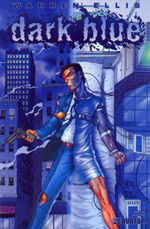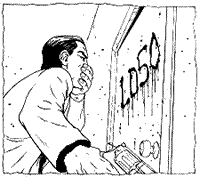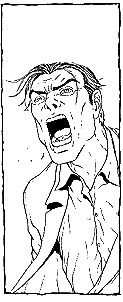>> The Friday Review: The Birthday Riots
>> The Friday Review: A Distant Soil: The Gathering
More...

 Writer: Warren Ellis
Writer: Warren Ellis
Artist: Jacen Burrows
Price: $8.95
Publisher: Avatar Press
Originally published in THRESHOLD #25-30
ISBN: 0-9706784-3-6
All hail the maverick cop. Staple of modern cinema, with his dark past, killer skills and razor sharp detective mind, he's sat in all our heads right now, his feet on the table and a whiskey in one hand. Whether it's Clint Eastwood asking how lucky we feel, Mel Gibson flirting with suicide, or even Chris Tucker thinking he's super tough, the "maverick cop on the edge" is one of the most over used stereotypes in modern cinema. We've had knowing, post-modern remakes, spoofs and even, God help us, a Stephen Segal come back.
In a genre so laden down with cliché, there's only so far you can go. A character type that was once new and interesting has become comfortable, unthreatening, and familiar. Until, that is, you transpose the maverick cop and everything that goes with him, into a medium he doesn't normally bother with; comics. Welcome to Warren Ellis' DARK BLUE. Policeman Frank Christchurch is, as usual, on the edge. The first time we meet him, he's beating an informant half to death. Remember that: not even a suspect, but an informant. This isn't the guy Frank's looking for, and within four pages, he's rendered him all but unrecognisable. Frank, at, first glance is Clint Eastwood, Mel Gibson and Judge Dredd all rolled into one. A lean, grimacing ball of justice and hate.
For a while, at least, the clichés arrive in the usual order. Frank is working on a case he's been ordered off, a case he's obsessed with involving a murderer called Trent Wayman. He's partnered with Debbie Thorogood, a short-haired, suit-wearing no-nonsense detective, and works under Lt. Lou Abbey, who tolerates Frank's savage violence and lets him continue working. If this were a movie, the voiceover would go something like: "Detective Frank Christchurch is having a very bad day."
But that's where the clichés end. As the story progresses and we see beyond Christchurch's job, it becomes clear that something is horribly wrong with the city, Frank himself, and our perceptions of both. A savage is loose in the city and every cop besides Christchurch and Thorogood is too busy getting high and assaulting prisoners to notice or care. This time, the maverick cop really is the only one who cares.
 DARK BLUE works on two levels, and this is the first. It is, on paper at least, the perfect, stripped down 'maverick cop' story. There's a cop, his partner and a serial killer in a city that's forgotten how to care. The cop is going to bring the serial killer in, or down, and doesn't really care which. He has no life other than his job and the only thing that stands between him and total mental breakdown is his partner. That's it, at least on paper.
DARK BLUE works on two levels, and this is the first. It is, on paper at least, the perfect, stripped down 'maverick cop' story. There's a cop, his partner and a serial killer in a city that's forgotten how to care. The cop is going to bring the serial killer in, or down, and doesn't really care which. He has no life other than his job and the only thing that stands between him and total mental breakdown is his partner. That's it, at least on paper.
However, the fact that this is a graphic novel allows the story to be looked at in a different way. While the hunt for the serial killer, Trent Wayman, is at the heart of the story, the book's format gives Ellis and artist Jacen Burrows the opportunity to examine the story in it's context as well as it's narrative. For a city to create men like Frank Christchurch, something must be badly wrong. And within a few pages, we find out exactly what that is.
This isn't the sanitised, politically correct squad room of BAD BOYS or LETHAL WEAPON. No potted plants, no witty banter. This is a precinct that is a microcosm of the city around it, home to assaults, drug abuse and attempted rape. The city has collapsed into chaos because the cops don't care, and the cops don't care because the city is in chaos. When viewed in this context, the reader can't help but come to the conclusion that Christchurch is in many ways a dangerous liberal. A man who beats witnesses half to death is the most well-balanced, dedicated cop on the job. This city doesn't just need Frank Christchurch, it deserves him.
This is the second level that the story works on, as a detailed examination of the maverick cop as a fictional stereotype, and the role he plays in his world. Christchurch is a fascinating example of this, with everything from his name to his actions telling us something about him. As his name suggests, Christchurch is a martyr, both to his job and his city. This is a man who has suppressed everything about his personal identity and life to focus on his job. At work he's always at the front, always in overdrive. Whether it's as the first guy through the door on a raid or beating the desk sergeant down to stop him raping a suspect, Christchurch is always moving, always acting.
 This in turn also places him in an interesting moral position. He's one of the only two cops in his precinct who cares, and arguably the only one who actually bothers to work. He's an active policeman, dedicated to protecting his city, but he does this by beating people half to death and fixating on one case to the expense of everyone and everything associated with it. For Frank, the job is everything and the body count it creates is not his concern. He's an utterly focused person, the living embodiment of his stereotype, with all the ugliness that this implies.
This in turn also places him in an interesting moral position. He's one of the only two cops in his precinct who cares, and arguably the only one who actually bothers to work. He's an active policeman, dedicated to protecting his city, but he does this by beating people half to death and fixating on one case to the expense of everyone and everything associated with it. For Frank, the job is everything and the body count it creates is not his concern. He's an utterly focused person, the living embodiment of his stereotype, with all the ugliness that this implies.
However, what makes the book fascinating is the point at which these two plot lines dovetail. At the halfway point, the dissection of the genre combines with the story itself and places Christchurch in a position quite unlike any other. He's forced to examine exactly what he is, and face up to the possibility that despite his willingness to sacrifice himself for the good of the city, they don't want him to. To say more would spoil the second half of the book, but suffice to say that Christchurch is faced with a crisis in identity that redefines both himself and his city forever.
DARK BLUE is, on the surface, the nastiest cop movie never made, mixing the brutality of Abel Ferrara's BAD LIEUTENANT with the humanity and jet black humour of Ellroy's LA trilogy . However, as a piece on morals and the price we pay for them, it has a tremendous power. Ultimately, Christchurch is forced to choose between himself and his self-image, with all the moral choices that go along with it, and what he decides makes for a fascinating and oddly moving finale. As always, Frank Christchurch gets the job done. By any means necessary.

This article is Ideological Freeware. The author grants permission for its reproduction and redistribution by private individuals on condition that the author and source of the article are clearly shown, no charge is made, and the whole article is reproduced intact, including this notice.


